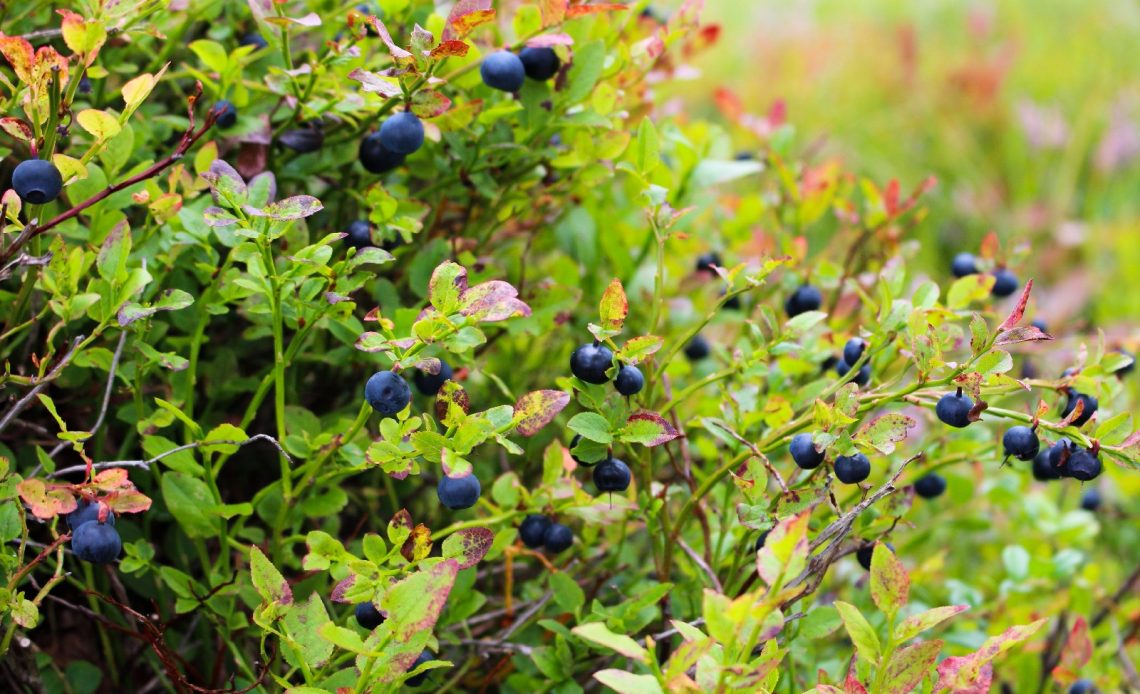

We’re here to help! Wild Yards is a completely free website that is 100% dedicated to helping you create a wildlife-friendly, sustainable yard. Read more
WildYards is reader-supported. When you buy a product through a link on our site, we may earn a comission. Every product is independently selected by our (obsessive) editors and our reviews are unbiased and objective. Read more about our mission or our privacy policy.
If you love baking and gardening, why not combine the two? Blueberries are easy to grow in containers and raised beds, and nothing tastes better than fresh blueberries straight from the bush. They’re perfect for making pancakes, muffins, and preserves. But blueberry plants can be susceptible to pests and nutritional deficiencies. Fortunately, blueberry companion plants can help.
Pine trees and beans reduce soil pH and add the nitrogen necessary for berry production. Ferns, basil, and thyme grow close to the ground, allowing the soil to retain moisture, meanwhile, azaleas and borage help attract valuable pollinators to help you get the best blueberry crop possible.
What are the benefits of growing blueberry companion plants?
Blueberry plants grow to be three feet tall by three feet wide, so they need plenty of room to branch out. These plants thrive in partial sun and in soil that has a low pH. And they love to be watered, especially when they start producing and their water requirements increase — blueberry plants can soak up four inches of water a week when they’re making berries.
Whether you keep your blueberries in containers or right in the ground, planting them in acidic soil with enough room to grow, and giving them plenty of water to drink will help get them started off right. But even with the proper care, they can still fall prey to damaging insects and nutritional problems.
Blueberry companion plants help support blueberry growth. Some of these plants repel insects that are attracted to the blueberry’s foliage and fruits. Others add important nutrients to the soil that your blueberries need to thrive. Before you try your hand at keeping blueberries, consider growing a few of their favorite companion plants as well.
What are the best blueberry companion plants for your garden?
One of the most important things to keep in mind when choosing companion plants (for blueberries or any other plant) is the plant’s growing requirements. If you have a backyard garden or raised beds, choose plants with similar growing requirements. This makes things much easier for you.
It’s also worth noting that, although many people like growing blueberries together with blackberries and raspberries, these plants do not share the same growing requirements, and therefore, do not perform as well when sharing the same garden space. If you want to grow all of these berries, grow them in pots. Otherwise, you’ll be better off choosing from the following tried and true blueberry companion plants.
Comfrey
This perennial plant shares the blueberry’s love of moist, acidic soil. Comfrey produces soft, fuzzy leaves that look much like sage, and small bell-shaped flowers draped from tall stalks. This plant has seen a resurgence in popularity among holistic gardeners in recent years thanks to its impressive medicinal properties.
Also known as “knitbone”, comfrey extract speeds up the healing process by stimulating cellular regeneration. When planted as a blueberry companion, comfrey acts as a natural mulch. As the leaves die and fall off, they surround neighboring plants with the organic matter needed to lock in moisture and restore nutrient levels. Comfrey tends to become invasive. However, it is very hardy, so don’t be afraid to shear it back if it encroaches on your blueberry’s growing space.
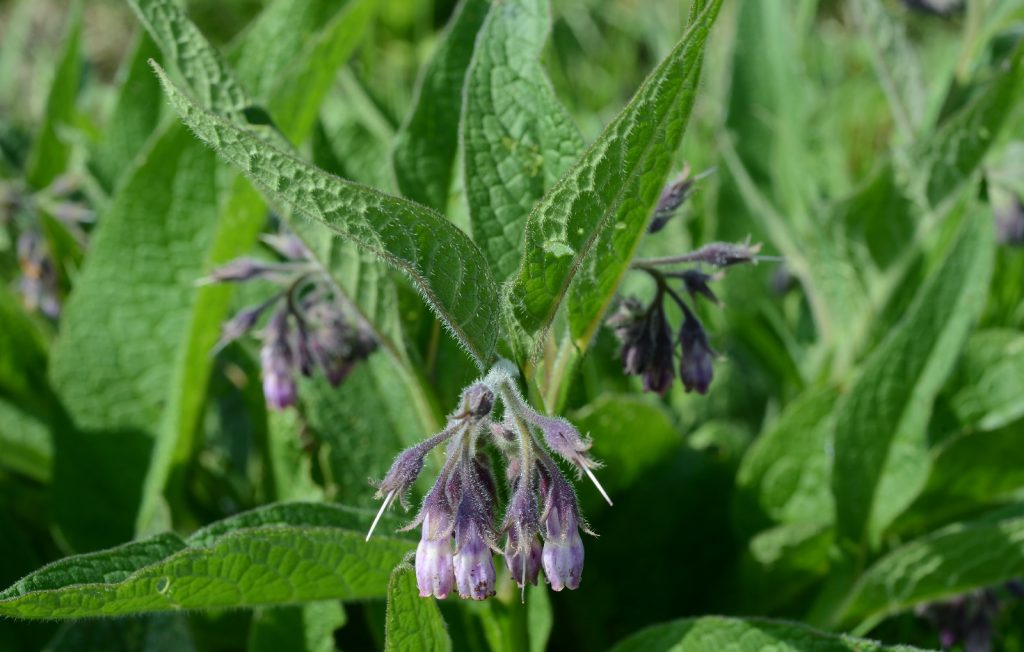
Basil
Basil makes a wonderful blueberry companion plant because it grows well in acidic soil, and doesn’t require a whole lot of attention, aside from regular waterings. This popular culinary herb produces a strong scent that insects hate.
Basil is a fairly short plant, topping out at around two feet, so it won’t interfere with the amount of sun your blueberry bushes receive. Additionally, these plants do not compete with blueberries for nutrients, so you can keep these two plants side by side without seeing either one’s performance suffer.
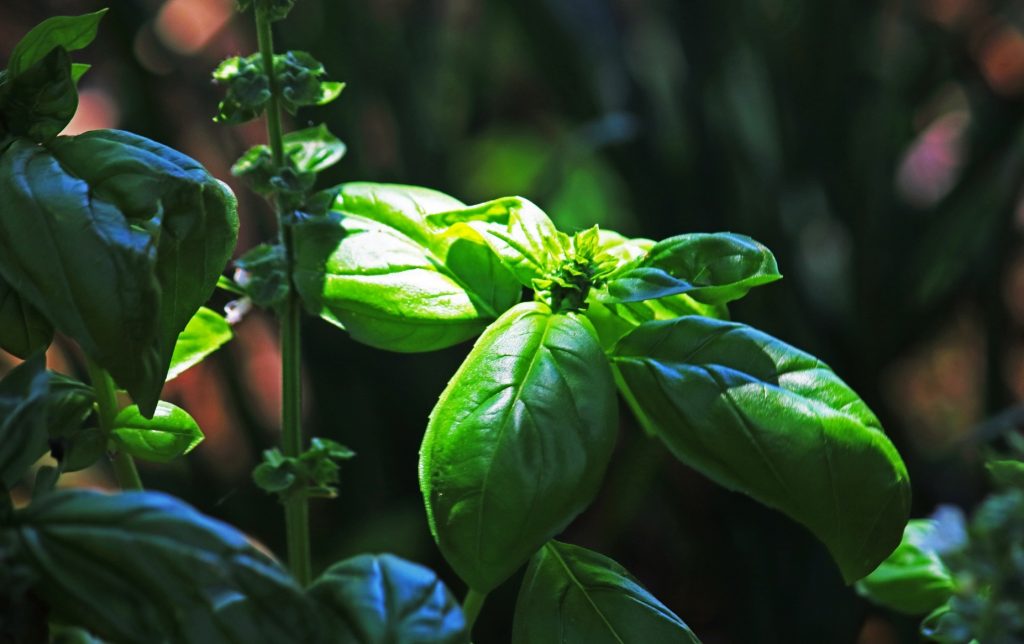
Azaleas
When it comes to blueberry companion plants, the first thing that springs to mind is other edible plants. But ornamentals have a lot to offer, too. Azaleas, for instance, attract valuable pollinators, including hummingbirds and bees, who love to peruse the flowers for their sweet-tasting nectar.
When planted near blueberries, these gorgeous blooms can improve berry production because they encourage these pollinators to visit the blueberry bushes as well. Azaleas thrive in the same growing conditions as blueberries. As long as you keep these two plants spaced well enough apart (five to seven feet should do the trick), azaleas and blueberries can grow in complete harmony.
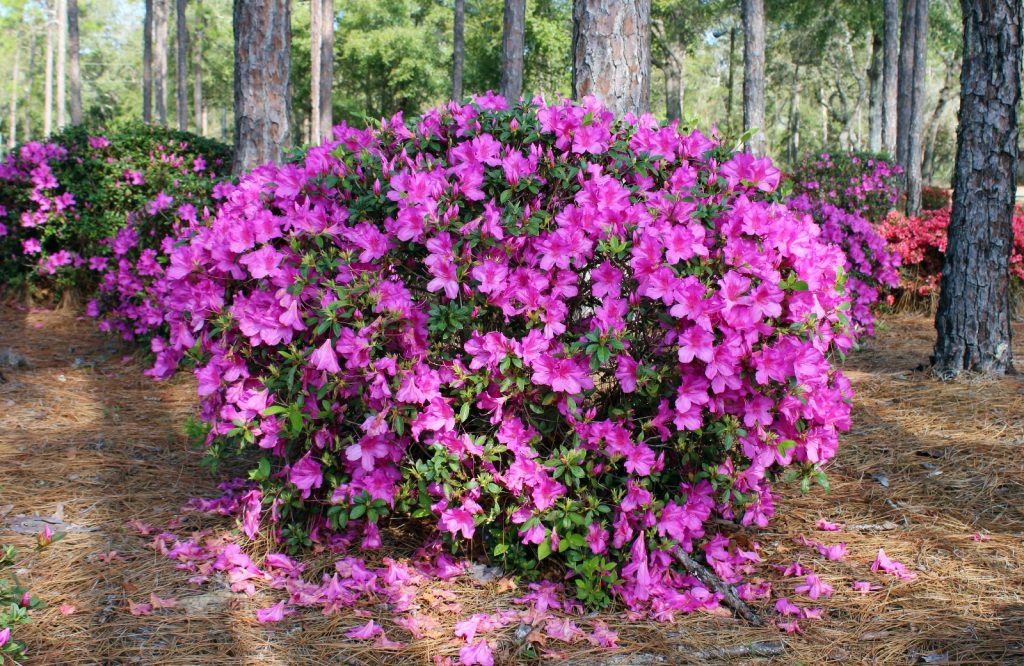
Pine trees
Pine trees are hardy evergreens that acidify the soil. If you have neutral soil or soil that is slightly alkaline, and you’re interested in growing blueberries, it’s highly recommended to plant a pine tree first. Give the tree a few months to get established, and that will also give it some time to lower the surrounding soil’s pH enough so your blueberry bushes will thrive there.
Be sure to plant your blueberry bushes on the East side of the pine tree, or wherever it will get enough sunlight. Blueberries are fairly hardy, but they don’t like too much shade, and won’t reach their full potential if they don’t get enough sun.
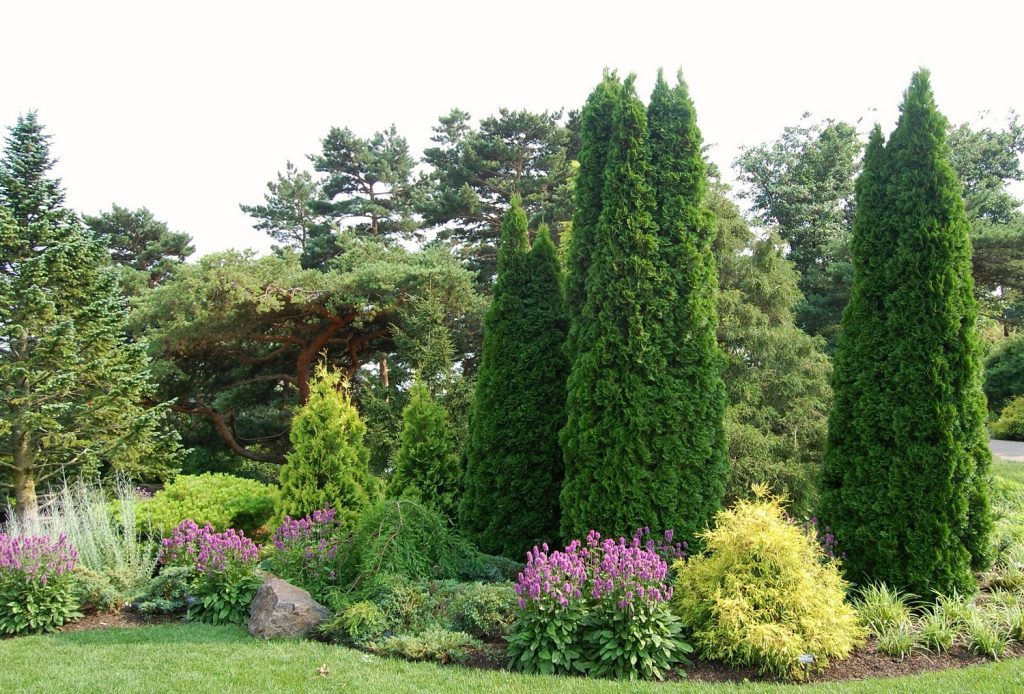
Beans
Beans are popular companion plants in general, thanks to their ability to help transform the nitrogen that’s in the soil into an absorbable form of nitrogen that neighboring plants can use. Climbing beans, bush beans, and peas are all excellent for enriching the soil, so choose whichever varieties you like best.
To make the most of beans as a blueberry companion plant, you can either plant a row of beans near your blueberry bushes, or you can grow them as a cover crop. Cover crops are planted and allowed to grow, mature, and produce. Once they die back, they’re plowed under so their nutrients can return to the soil. This is an excellent technique for blueberry growers, because the added nitrogen helps boost flower growth, and results in higher berry yield.
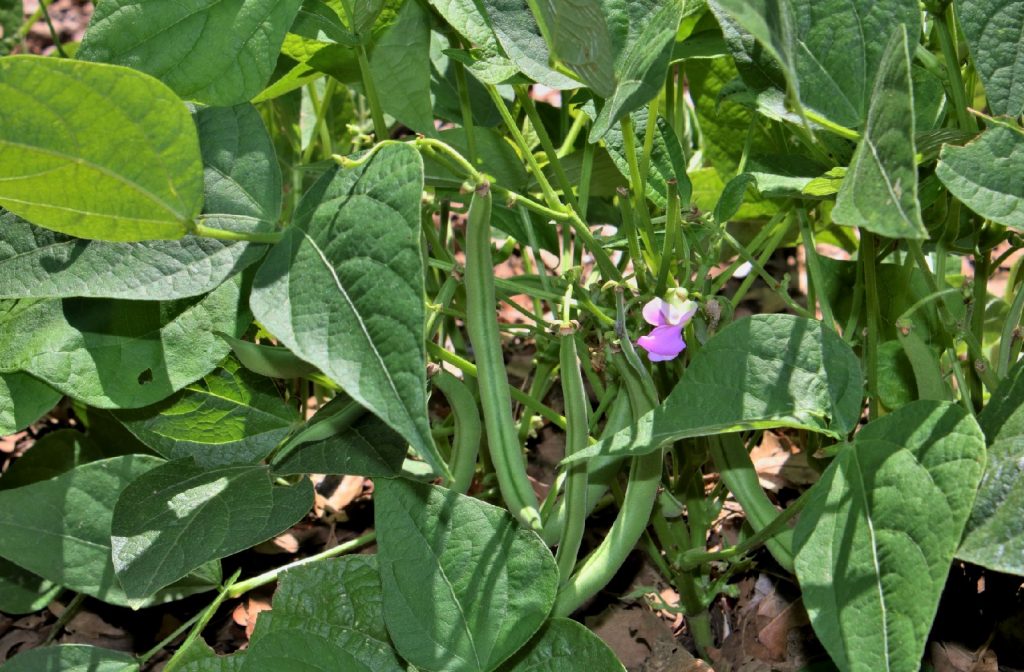
Ferns
Rabbits and deer generally do not like ferns. These plants produce rough, stiff foliage that’s unpleasant to chew, and it doesn’t taste too good, either. Growing ferns around your blueberry bushes can help keep the wildlife at bay.
Most ferns share the blueberry plant’s growing conditions, as they do very well in partial sun and acidic soil. Additionally, ferns like damp soil. They make excellent blueberry companion plants because they help hold moisture in the ground.
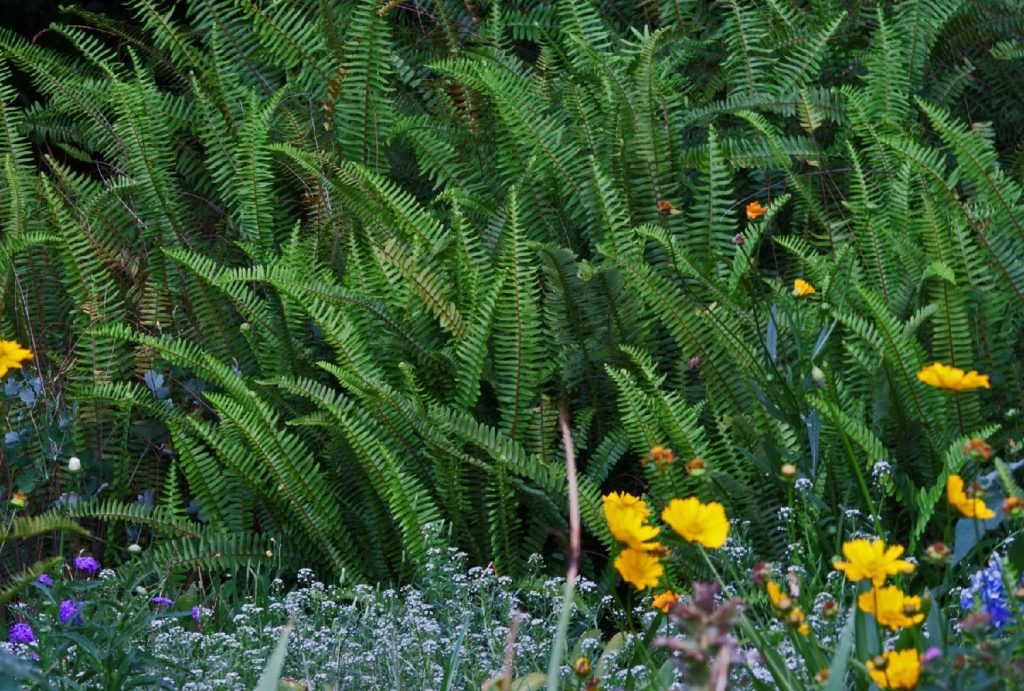
Borage
This is an excellent companion for so many plants because its beautiful, delicate bell-shaped flowers attract pollinators like a magnet. Bees, beetles, and butterflies are just a few of the hungry pollinators who enjoy visiting borage. And once your borage plants catch their attention, they’ll get a chance to check out your flowering blueberry bushes, too.
Blueberries are self-pollinating. Their flowers contain male and female parts, so, technically, they don’t need insects to help them produce fruit. However, pollinating insects still support the pollination process, improving berry production so you get the best harvest possible.
Thyme
As a low-growing ground cover, thyme acts as mulch for blueberry bushes. It keeps the ground around your blueberries moist and cool so your blueberries can grow their best. Thyme loves slightly acidic soil, and it doesn’t compete with blueberries for nutrients, so it will never impede the fruit’s growth.
Thyme also has the advantage of being smelly. To us, that aroma smells good, but bugs, rabbits, and deer aren’t as fond of that scent. Keeping thyme around your blueberry bushes helps prevent insect infestations, and may even discourage hungry foraging mammals from stealing the berries.
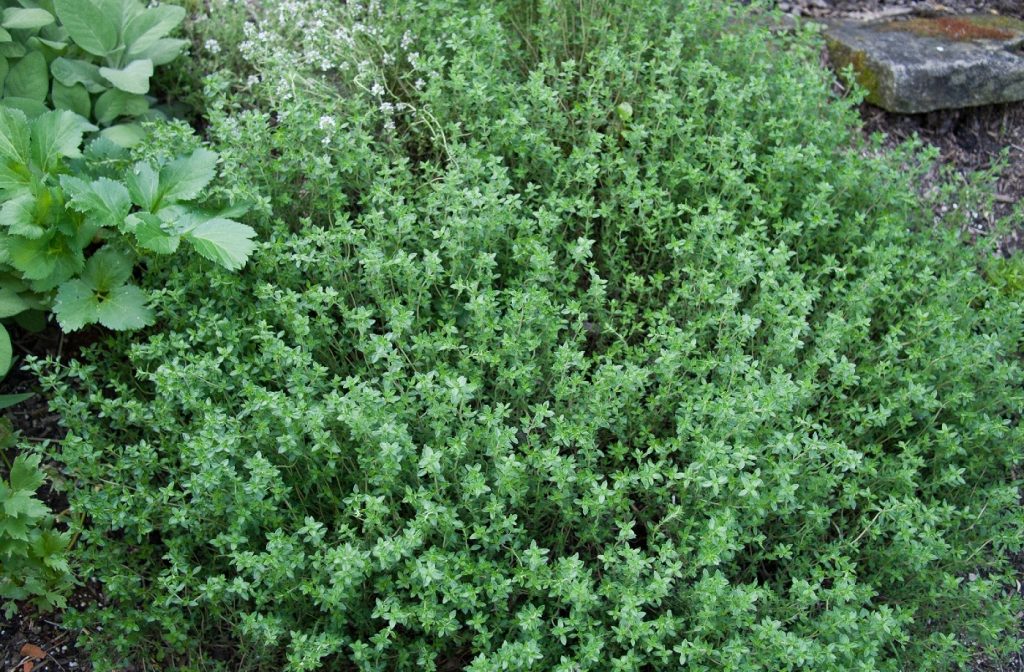
Which plants should you avoid planting with blueberries?
Not all plants get along. Certain plants can hinder the growth of your blueberry bushes, which can have devastating effects on berry production. So, when planning your blueberry patch, be sure to avoid growing the following plants nearby.
Tomatoes
It can be tempting to grow tomatoes with your blueberry bushes but don’t. Even though both of these plants like acidic soil, they both require a lot of nutrients to produce. So not only will your blueberry plants suffer if you grow tomatoes too close to them, but your tomato plants won’t grow very well, either. If you’re determined to grow both tomatoes and blueberries at the same time, place them on opposite sides of your garden, or plant them in separate containers.
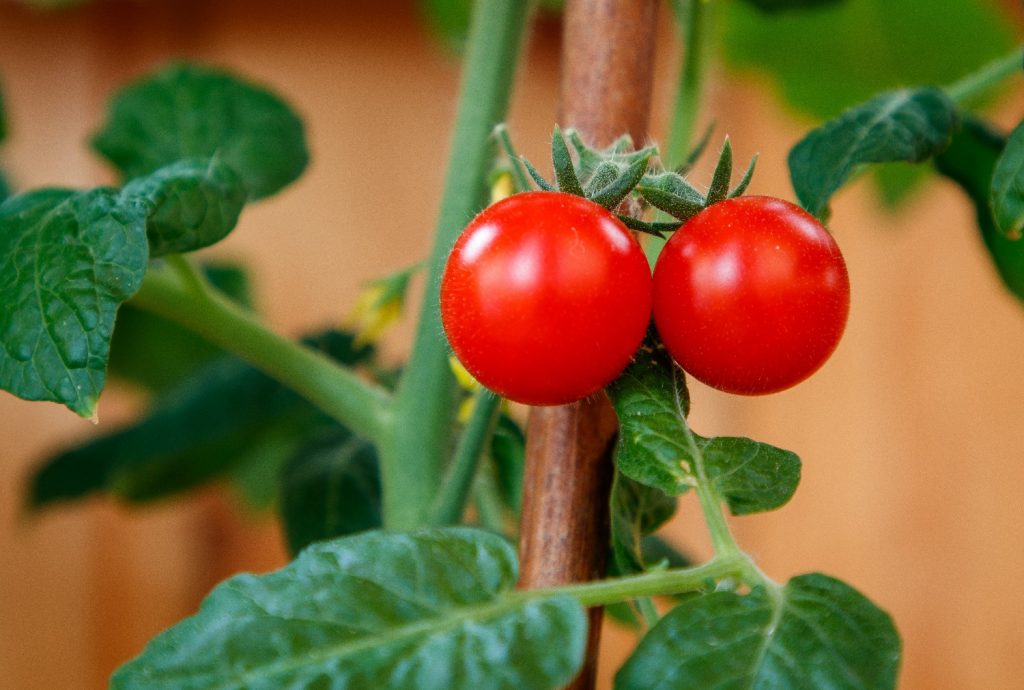
Eggplant
Eggplants, too, make poor blueberry companion plants. These nightshade vegetables are heavy nutrient users and will impact your blueberry bushes’ ability to produce berries. Additionally, Eggplants (and tomatoes, too, for that matter) can attract pesky insects, like aphids, mites, and stink bugs, who will be all too happy to chow down on your blueberries once they’re done eating your vegetables.
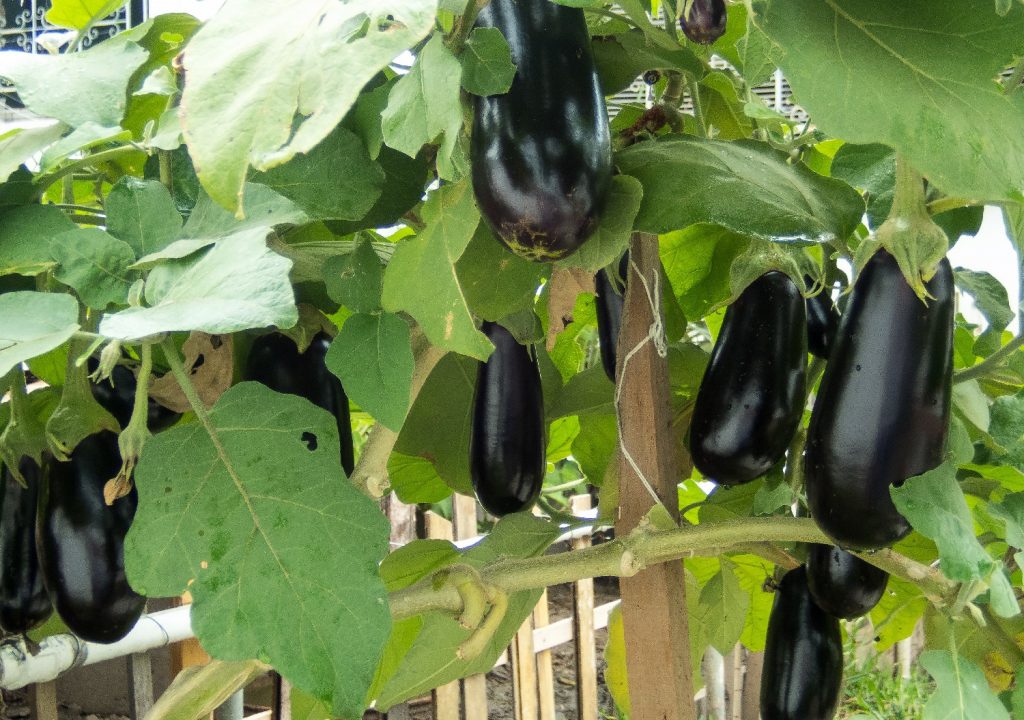
Onions
Generally speaking, onions make excellent companion plants. They’re stinky and they have a strong, off-putting taste, so they’re excellent for repelling insects as well as hungry deer and rabbits. Unfortunately, onions do not make great blueberry companion plants because, like tomatoes and eggplants, they take a lot of minerals out of the soil. If you’re determined to use onions as a companion plant to your blueberries to ward off pests, grow your blueberries in a pot and place them near your ground-grown onions.
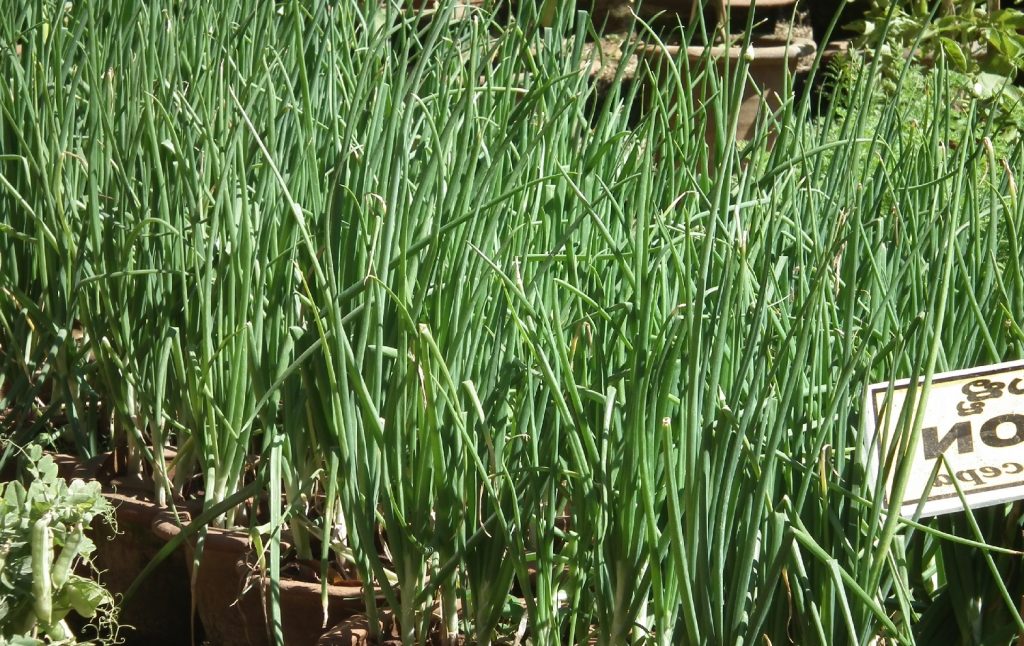
Do blueberries need a companion plant?
Blueberries are so rewarding to grow, and homegrown blueberries taste much better than storebought, making them worth the wait. With the help of these blueberry companion plants, you can increase your crop’s yield and improve performance season after season.
